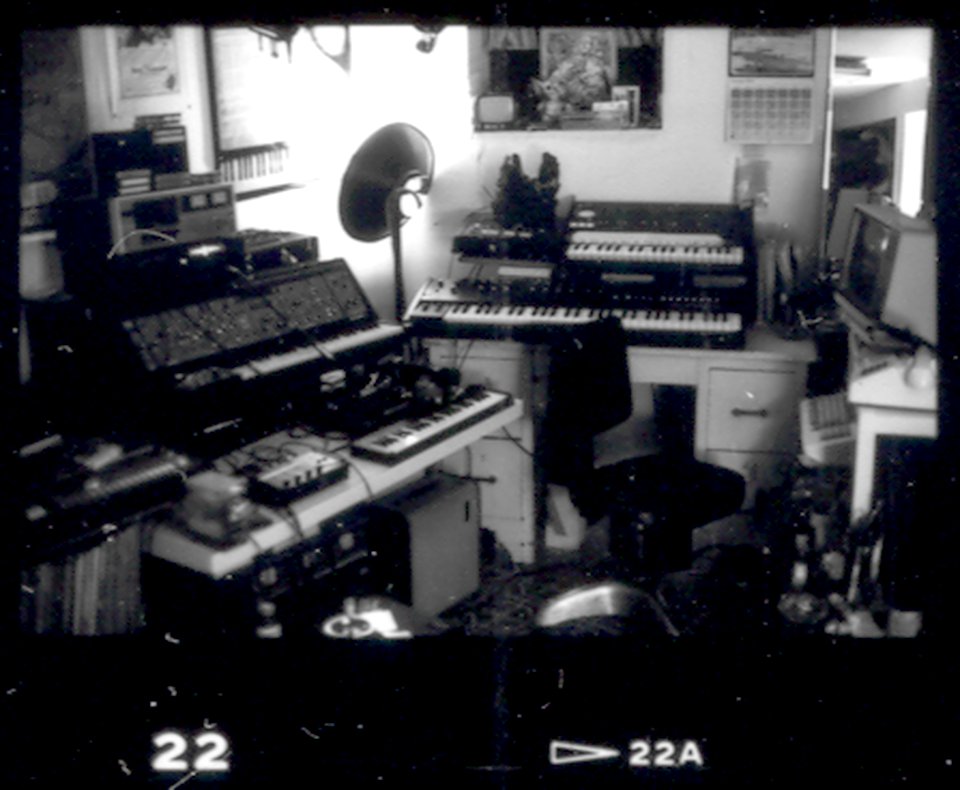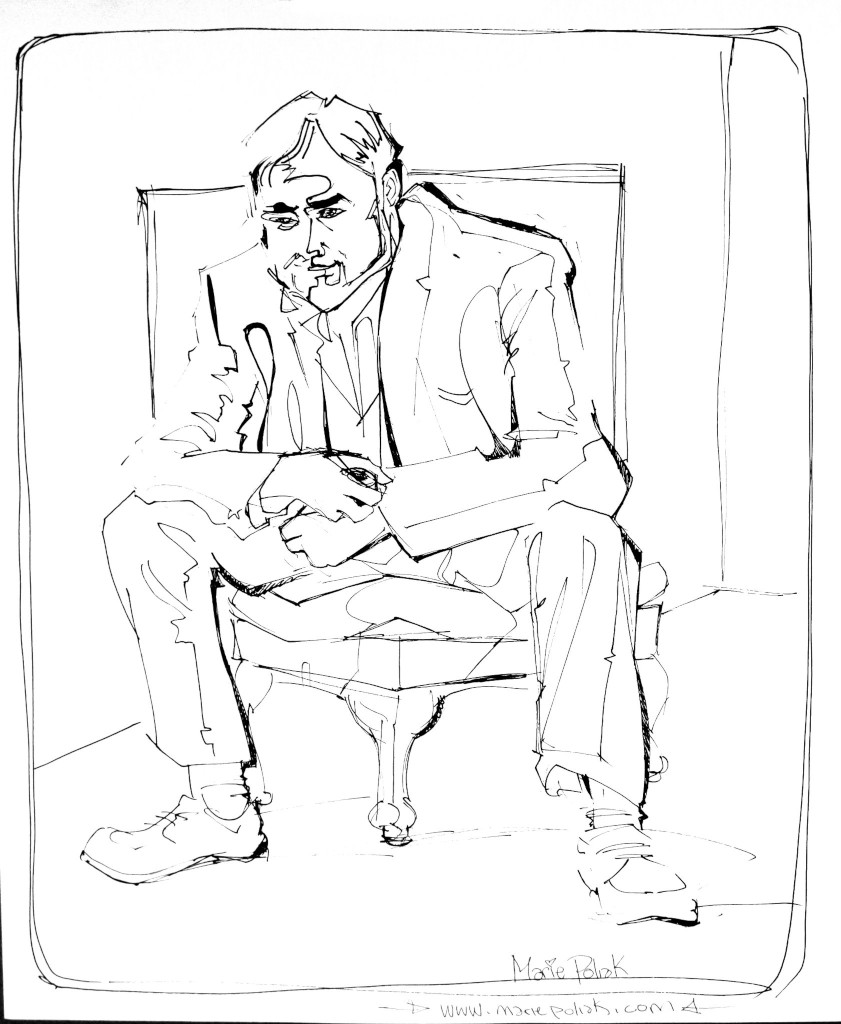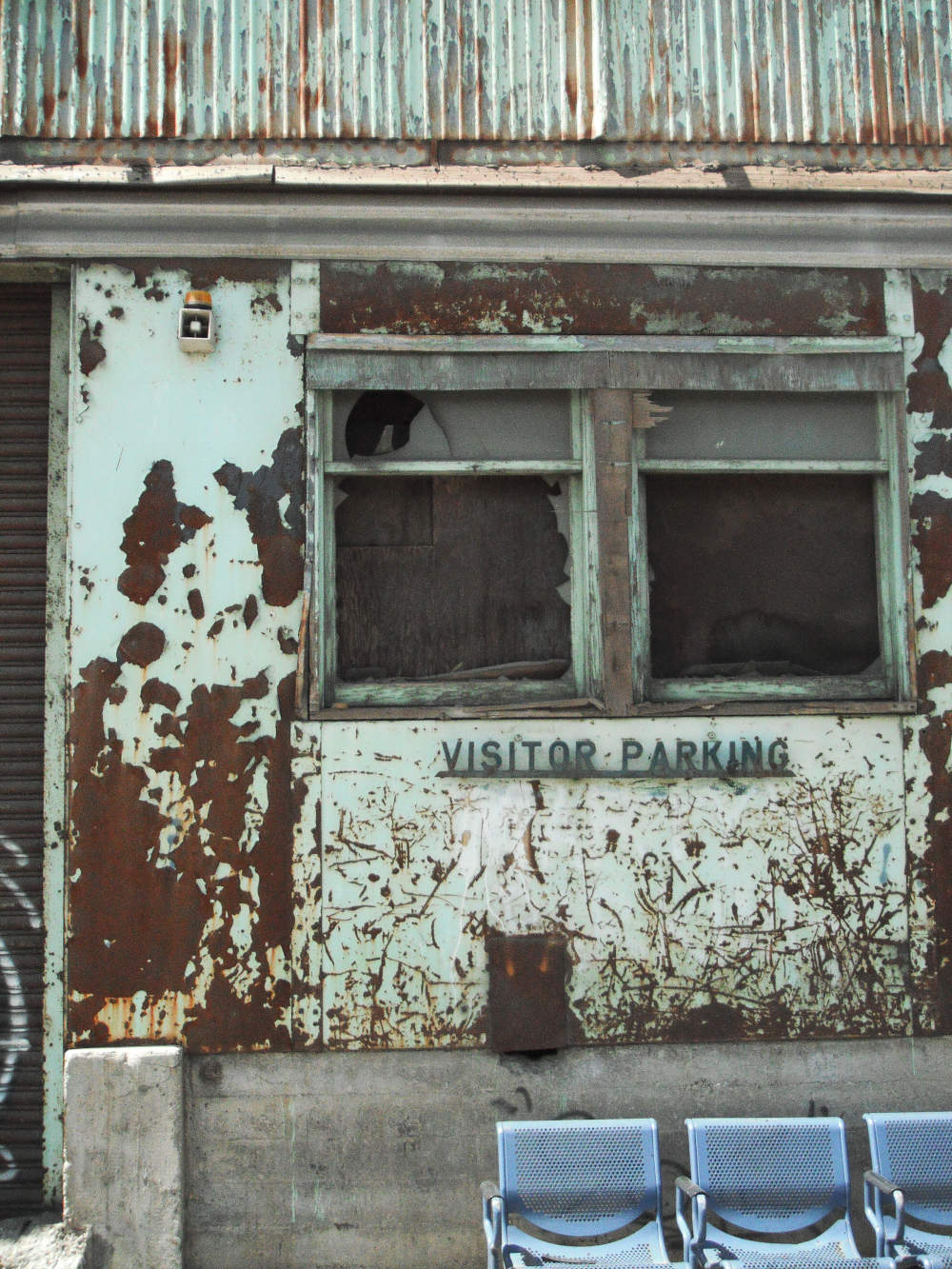I really did not like Lindsay, nor was he in any way impressed with me – both for fair reason. He was an older man, the very model of restraint discipline and propriety – straight as straight could be. I was a seventeen year old dance club goth who had to glue my chin-length bangs back with hairspray every morning, just to appear office acceptable, and always felt as if I was in costume when I wore a suit (but felt quite natural in full makeup orchestral tails and combat boots). I was an outsider, an interloper, and even though I was just the mailroom clerk, he knew I did not fit.
For my own part, as a refugee from commune craziness who was still trying to figure out the normal world, I felt quite a bit more like an anthropologist than a clerk, and even though I also enjoyed the shipping/receiving and mastering the behemoth collating photocopier (then worth the price of a small house), studying the people and structures around me was my main source of satisfaction in the job. I’ve written much more about this funny phase of my life in my books (about which much more soon), but I didn’t ever mention Lindsay, and I should have.
After months of studying all the staff of this major corporate software company from a position that made me situationally invisible (in the sense GK Chesterton once observed mailmen were, for their absolute unremarkability), I was convinced that Lindsay was the most dedicated company man they had – always came in early and worked late, never ever caused a problem or screwed anything up.
So one Friday near closing, when I was substituting on the switchboard, and I saw him leaving the director’s office with a bright red face and popped out eyeballs, I was really surprised. The speed of gossip varies in any environment with a political structure of course – but again – being the mailroom guy means as often as not you are the medium of conveyance, so it didn’t take me long to put it together. He had indeed been fired with immediate effect on a trumped-up excuse, the management fully expected him to sue them, and were prepared to make some concessions there, to achieve their goal – which was to push this dedicated company man out the door one month before his pension became vested (legally obligating them to continue to honour his service after retirement, this for my younger friends who have, often as not, never even heard of indexed pensions).
Even though I didn’t like him, I still asked around to see if there were other reasons which weren’t as clear, but absolutely no other accusations against him came to light (and the people who worked most closely with him actually liked my youthful spirit and excessively creative (okay, zany) memos, and so were my pals – they would have told me).
Now I should situate this in objective time – 1982 – the early days of Reaganomics, a bit before the capital gains bonanza lead to the liquidation of thousands of superb established and viable businesses by pouncing psychotic vultures (summarized so well by Stone in ‘Wall Street’ with Gordon Gekko’s line “Greed is good.”).
And already the screws were being tightened – the old social compact between institution and individual was fraying.

Woz not Jobs
I was a much better fit for the early microcomputer explosion – first, because I was still a math nut, so I considered it outright fun to dig into any problem which could be solved by math or logic – but secondly, because nobody in the crazy wild west clone corner scene at College and Spadina ever cared how you dressed. There were hippies, scruffy anarchists, shoestring entrepreneurs, mad scientists operating out of their mom’s basement and original slide-rule checked shirt nerds, all happily coexisting and cross-pollinating, thanks to our shared optimism and enthusiasm.
What counted for that scene was first what you knew and then what wild new things you were dreaming about (which proportions inverted for the matching computer scene down on artsy pre-gentrification Queen St W) ;o)
Again, I’ve written elsewhere about the hilarious pratfalls of being a computer salesmen back in the days when it was very nearly pushing contraband – “I can’t give you the EPROMs you’ll need, but I am going to leave a phone number on the desk and turn away for two minutes, and if it isn’t there anymore when I turn around, that’s fine.” But I wasn’t able to include a couple of very important points. The Apple II computer is unique in history for reasons which are often misunderstood. It took-off where so many others tried and failed because it was a wonderfully open system. When you bought one, they not only gave you a very large complete (and beautiful) poster sized schematic for the whole circuit board, they gave you the source code for the operating system (in a hyper practical spiral bound volumes) and both of the programming languages (two versions of easy and flexible basic, came with).
On the one hand – the entire clone industry which I enjoyed so much in the early eighties sprung from their openness – it was very easy for people to take that schematic, use exactly the same chips, but move a few traces around so it would not be the same ‘image’ (which was why the legal fight concentrated on the more easily copyrightable ROM chips).
On the other hand, hobbyists and determined small start-ups solved every fundamental problem there was, and Apple didn’t have to spend a penny on all of this free research to extend the range of their platform in all directions. When I say all the problems I mean it, too. By the mid eighties this shockingly simple computer could monitor video, synthesize and process digital audio and communicate ideas from around the world with a vast network of other computers and deep troves of knowledge on the old Bulletin Boards – the civilian precursor to internet. (The kingdom of SYSOP).
I can’t help thinking that the fact that the Mac has been the most locked down and inaccessible system ever since represents corporate resentment and ingratitude to this day – the control freak spirit of Jobs, the very opposite of his partner the always far more democratic fun loving and generous Woz(niak)- who also basically did those schematics and that coding himself from scratch, while slick Jobs was out tie-wearing hustling and pitching.

Social programs are a complex and fraught subject, but I will never forget how they helped me, nor the way one key boost can turn a whole life around. At one point in my young life I got tired of hustling computers, and really wanted to get a job in a recording studio (not that I in any way deserved it, mind you, I just really wanted it). An uncommonly kind caseworker at the office of health and welfare (what my friend always called Wealth and Hellfire Canada) told me, “Paul, you’re obviously talented and I’m sick of seeing you in here, pick a course, and I’ll get you benefits to cover it.” With that he plunked a huge overstuffed binder in front of me and left the room. inside were ten-month certificate courses for community college and as soon as I saw Audio Repair and Systems I was excited. Finally, a way to work with musicians and be of help to them, which would allow me to make whatever art I wanted, without having to chase market taste. A precious kind of artistic independence already being taught to me by a brilliant free improvising saxophonist, who took me under his wing and kept me dancing hard (and learning harder) for more than a decade.
I felt lucky in a number of ways – but honestly, I was scared too. I hadn’t attended a formal classroom since grade three, and I had never done an academic exam in my life (though I enjoyed all kinds of tests for fun, just fine).
Again, I have written about my experience of eighties George Brown College elsewhere – but there is a big point I was unable to incorporate about the institution itself. I was a student there twice, and after my second pass as a student (to add Video to my professional chops) they asked me to work there for a six month term with the job description “Lab Tech”.
But you have to bear in mind here – even all these years later I was still feeling like one part anthropologist, every place I went, observing what the locals called normal, and considering whether I wanted to emulate or reject it (don’t get me wrong though – feeling like a perpetual alien is actually kind of fantastic for a writer – because even though everything becomes a bit awkward and overly conscious, it also becomes art-food!)
In that six month gig I had a chance to really get to know the teachers who had intimidated (impressed) me most as a student, and I really came to love a few of them. I was also there for the retirement of several of the wise old hands, and the hiring on of a fresh new young buck – direct from industry. Straighter than straight (I swear, he even wore the same big square framed glasses as Lindsay).
In the interval, what with all the retirements and vacations, the lab ended up being staffed for several weeks by me and the dean of the department, who would enter the lab at eight o clock sharp, take any students present into the small side-room and then lock the door behind him, so latecomers were completely excluded from his one hour lecture, after which he would leave the lab entirely for the day. Which left me teaching the course – which was actually fine by me, because I not only knew the coursework, I knew the actual state of the industry most of the students were aiming to join – the home audio and music scene (rather than the corporate shirt and tie side of electronics).
The funny thing is – there was never one moment in my twenty years in audio where the pay lived up to the promises of the professors (usually, it was less than half) but I had a far easier time explaining that to the old hands who had seen several industries rise and fall already, than I did to the suit and tie corporate true believer who was supposed to replace the wisdom of these far more seasoned, experienced compassionate and professional wise men.
The fact that black Friday – the stock market implosion of 1987 – happened while I was studying the first time – has a lot to do with this shortfall. The big aftershock in ninety three pretty much finished-off the labour premium and dignity of the skilled trades in North America (of course with exceptions – but I’m talking about the scale and proportions here).
Ninety three – that’s thirty freakin’ years ago now – and you know the amazing thing? Most people still haven’t really noticed that it happened, let alone that it happened like a wrecking ball.
I mentioned exceptions there, and I know I have taken shots at the collective damage of boomer narcissism several times, but this is actually the clearest distinction – the exceptional boomers I love most are precisely those who do NOT assume their experience was in any way normal, and are aware that young people ever since have been struggling against a growing complex of mounting unfairnesses. A job? A career? A solid relationship? Decent housing?
Absolutely none of these old basic social goals can now be won by reliable steady effort alone.
They aren’t gone altogether, and it is incredibly important that our kids know it is worth trying and building all kinds of skills for the future. But the way to do that is to prove to them it really will be useful, by proving that our skills ARE.

OCA
Back in the eighties, before the virus of academic everything and credentialism infected the world in perhaps the most outrageous power-grab by the middle class in our recent history – so that you now need a university degree just to apply to be a mailroom clerk – the Ontario College of Art was an entirely art focussed institution, and my friends who went, were absolutely rapturous about it. Toronto had tons of cheap unused industrial space then too – studios aplenty.
In those days everyone studied tons of everything – printmakers took sculpture too – and sculptors learned about type. They had a foundry in the old Stewart Building on College St, so students could produce a genuine bronze themselves, and there was a world renowned glass blowing program. Above all though, there was work – constant time in the studio working with models and watching other hard-struggling artists grappling with the same problems.
I can’t easily convey how much pleasure I took working at OCADU in much more recent times (and I remain hopeful that I will one day be able to return to the model stand, to again make my small whimsical will-powered contributions). But I never did stop being an anthropologist either, and as I’ve gotten older I find myself learning from and teaching students and teachers alike – of course, at art school this is especially easy, because the artistic quest in common gives many a diffuse but very sweet sense of all belonging to one big seeking family.
Several professors instructors and retired veterans of the great ship remain dear friends of mine, and I think very highly of some with whom I have lost touch. At one point, I considered running for the union rep of the models, which gave me a good excuse to dig into the (in-house and more or less powerless) union. There did seem to be a lot of simple things that could be done (safety-wise especially), but actually getting them done didn’t look likely at all. Still feel bad for not taking the challenge and dragging the burden a ways, but considering the timing (just before Catherine fell ill) I’m very glad I was sensible enough to decline that extra giant heaping plateful of stress.
Models see one thing at the new OCADU which is sad – the potential which the organization can no longer organize itself to realize.
The faculty of art has some wonderful things to offer – the faculty of design does also – but were I lucky enough to be able to take a turn as a student, I would have a heck of a time choosing between them – and this after auditing dozens of classes of superb and inspiring teachers! (models don’t have to – but I always stick around for the lectures, even ones I’ve heard before).
Of course every student should have exposure to wild experimentation and deep soul searching and also learn how to execute with hard nosed rigour and finished art standards to a tight deadline. The romantic in me wants to call these the highest and lowest purposes of art – but the cartoonist in me would instantly reverse those polarities! (with a gleeful defiant smile, demanding the respect too long denied that medium).
School is for trying stuff, expanding our range, discovering things we didn’t realize were inside us. Let us not forget that the brilliant William MacElcheran, one of their most notable graduates, started from the carpentry program! But most of all it is for building sinew. The question I was most interested in asking as a union model rep was – isn’t there some way to preserve model hours for students – and yes, work for people like me – instead of cutting them every single year?
More and more time jumping academic hoops so your art degree will also qualify you to be a mail room clerk in a credentialist world – but less and less time in a studio, working hard on live art problems with your fellow students. (To do it right, you now have to bring your own mania)
One student told me that her mom was in love with me – because she had framed a drawing of me and hung it above the mantel piece – which made me laugh – and I’ve seen some wonderful portraits over the years, with lovely attention to non-obvious properties (one kid wanted to know my philosophy, so he could paint that too – and one wanted me to empty my pockets, so he could understand exactly what was producing the lumps he was sculpting). But one class stood out for me, and produced the most startling likenesses by far. Two students that year sculpted me in the bust class of the extraordinary George Boileau, and then later drew me and finally returned once more to paint me in the class of David Campbell who has the finest subtlety discerning eyes and insight which I have ever yet encountered.
I was not surprised that his students did so well with me (and indeed, my other model friends), their diligence in the studio and hard work on perception showed up on the picture plane. But I’ll never forget one of the last times I sat for Campbell before he retired. I usually stay a little after class, just to finish up the many conversational threads I was working on earlier (with both instructors and students), but this time he actually asked me to wait. He came back a few minutes later with a cart piled high with large drawings, and from the beauty of the one on top I asked “Your stuff?”
He smiled sadly and shook his head, “No, this is student work from years ago, when they got lots of model time.” I turned drawing after drawing, astounded at the quality of anatomical insight and rendering. Masterwork stuff – people on the DaVinci track – or at least people who had proven that road was open to them – itself an accomplishment.
When I looked up again he said, “I used to be able to get sixty percent of my class up to that level. Then they cut the hours and I could only get about twenty percent of them that far. And then they cut the hours again, and again.” He paused a moment then finished almost in a whisper. “I haven’t added a new drawing to this stack in years. They just can’t get there with the resources they have now, it wouldn’t even be fair to expect it.”

A Rust Sale, Maybe? (Some kind of oxidation, that’s for damned sure)
There were aspects of Reaganomics which really did resemble a fire-sale of old economic stability and relationships, but the Clinton years did nothing to repudiate the worst of it, and added new stupidity to the mix (prisons for profit? this is your freakin’ good-guy?). W was kind of terrifying – ushered in an age of state paranoia and endless warfare – but again, Obama did nothing to repeal the worst of his excesses, and added new stupidities (rescuing the bankers instead of the working class actually should have told us everything, right out of the gate). The guy gave the CIA an army.
But that’s all big scale stuff – the smashing of national hopes and aspirations. It definitely helps to make us all feel more hopeless, but it’s the intimate reversals which really raise our blood pressure and lower our sense of civil belonging. The company man ousted just before his loyalty pays off, the earnest student who never once sees the rewards promised (which were supposed to justify the tuition, so often won in the first place only by entering into usurious debt), even the dreamer – who is no longer given the necessary alchemical fire to burn away their dross and shine true.
And most of all the poor middling schlub who just wants to get by, be a good person and not have to worry constantly about every single damn thing all at once.
YOU ARE NOT SUPPOSED TO NEED A DEGREE TO CONTRIBUTE OR TO FEEL USEFUL. Wow though – we slam that class door hard now – using computers to filter out the riff-raff before they even pollute the attention of the glorious “Decision Makers” – which is perhaps a clue as to how our mutual blindnesses have become so hardened.
We are all, I’m afraid to say, casual digital powered bigots, and grotesquely proud of this fact. We don’t use our communications to enhance our love understanding and connection, we use them to reinforce what we already think, so we can learn as little as possible and stay proud of our most harmful and least rational furies.
Ahem – if what we already knew was adequate to the moment, we wouldn’t be in this freakin’ mess in the first place!
(like, duh)
We all have learning to do, and growing, and especially inspiring and nourishing our young with HOPE – and I don’t mean some bullshit insubstantial feel-good excuses – I mean a fair wide open path to stability participation and contribution for any who want it.
For forty years now the middle class has been conned into thinking of themselves as ripped-off rich people, instead of poor people who got a break (the way we mostly thought of ourselves, back when we were making decades of labour progress). By falling for this ego flattering con we have not only denied our own working classes but our children also, and their anger and frustration is not about the loss of white privilege – it is about the long term corporate destruction of the dignity and hopes of an entire social class which we all used to recognize as our brothers and sisters.
Now? Really not so much. Too many Pavlovian-device reinforced theories keep getting in the way of our own patient personal witness and natural solidarity – no time now to be humane or fair minded (nor slow down enough to thank or savour).
A staggering number of clueless arrogant and dangerously dehumanizing academics badly need an extended tour of duty in minimum wage retail, if they are to have any hope of regaining contact with reality, heart and their beloved (and yet utterly betrayed) “forces of history.” As it stands – the vast majority of those snobs wouldn’t touch us normals with a ten foot Prole!
And as for the ever-infuriating ‘kids these days?’ What do they need?
They need us – of course.
¯\_(ツ)_/¯
Note – the lovely ink portrait above was an after class gift from Marie Poliak, who continues to produce superb and cool artwork to this day! (and a truly great pairing that is)
Thanks again, that was a memorable studio day – made even better by your skill and generosity!









